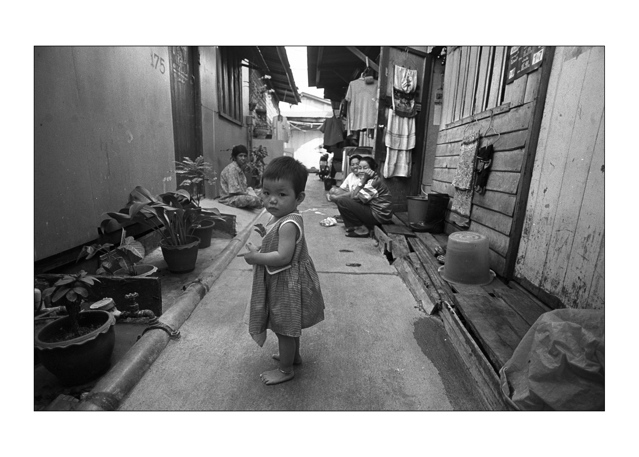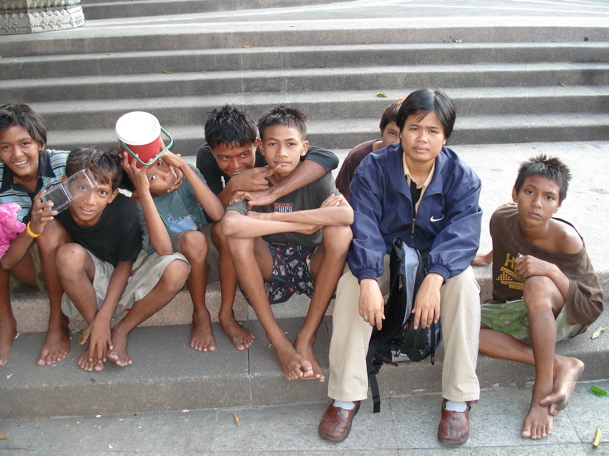Anti-Trafficking and Legal Aid Centre

Program Mandates
- To protect street children in Bangkok, offering solace and safe shelter at all times.
- To rescue slum children from abusive environments.
- To prevent vulnerable children from being sold or trafficked.
- To protect and defend poor children in legal matters.
Street Children Outreach: In our walks through many slums, we have been meeting, protecting, and taking in poor street children for over thirty years, and offer as normal a home life as possible within our shelter program.
Our outreach efforts have strengthened through the years as has our close cooperation with key child protection institutions, including the Children's Welfare Department and children's courts.
Anti-Trafficking and Legal Aid Centre: The HDF-Mercy Centre Legal Aid Program and all its activities have grown out of the needs of the children we meet on the street whose rights are continually abused. In 2000, HDF-Mercy Centre opened the first legal aid center in Thailand dedicated solely to assisting poor children in legal matters: children accused or victims or witnesses of a crime; children being abused; and children in grave danger. Since 2000, we have officially represented thousands of children in police stations and courts.
Thai laws now require that an impartial third party be present when police question or detain a child involved in a potential criminal proceeding. Today we are registered as a third-party representative in over 60 police stations in the greater Bangkok area and receive requests, often daily, from police authorities to assist children in need of legal representation.
Geographic Coverage
Greater Bangkok - all major congregations of street children in addition to Klong Toey and several densely populated slum communities.

Anti-trafficking and Legal Aid Activities
- Protecting the legal and human rights of poor children who are victims of rape, abuse, and trafficking, accompanying them at all times during legal proceedings and providing a safe house whenever they are in danger.
- Securing the birth and identity certificates for unregistered children. These children are the most vulnerable to transnational trafficking as they can disappear without any legal trace. Without documentation, they also have no right to go to school or work in Thailand.
- Providing legal counsel and defense during police interrogations and court proceedings for poor children who are victims, witnesses, or accused of a crime.
- Ensuring the welfare of those children while awaiting trial.
Street Children Outreach Activities
Trust, education, protection, continuous friendship and rehabilitation:
- Visiting the children on a regular basis, giving them food, drinking water, milk, snacks, soap, toothpaste, baby powder, first-aid kits, and other basic necessities
- Educating these children about HIV/AIDS and other health issues
- Giving the children confidence-building lessons through games and interactive art
- Guiding the children to temporary foster care homes if the children are willing
- Delivering sick children to hospitals
- Encouraging the children to return to school
- Taking the children on camping trips outside of Bangkok
- Opening the door to all street children who are willing to live at our Mercy Homes
- Creating profiles of the children for continuity of social work care
- Uniting the children with their families whenever the home environment is safe and the child is willing
- Providing those families too destitute to care for their children with basic living needs to keep families together
- Advocating for the rights of poor children.
Challenges: The dangers continue to worsen. Human traffcking has increased dramatically. More so today than ever before, these children urgently need our protection.
Success Story: Legally, undocumented children don't exist. That was the case with Bird, who came to us from the streets at age eight. He knew that his nickname was Bird and that he once had a mother; that his mom left his dad and village and moved with Bird to Bangkok when he was four; that by the time he reached age seven his mom was dead. Bird stayed with us during holidays as a part of our family. During the school year, the government sent him to a special school/reformatory that allows stateless children to earn some rights of citizenship. We never stopped looking for Bird's family. Eight years passed. Bird turned 14. Eventually we found Bird's home province, and from there his home district, and eventually the village leader of Bird's village, who said that he remembered Bird, but that his mom had told everyone Bird has died.
And then we found Bird's Dad! When we drove Bird home, the entire village greeted him and held a party in his honor. Today, Bird has settled into family life and farm work with his long-lost dad and a newfound brother. He is now a Thai citizen.
